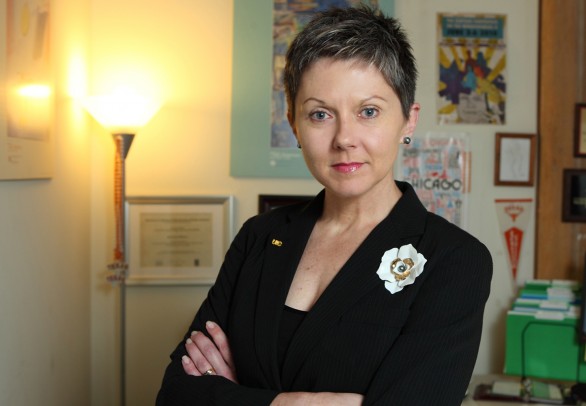Faculty members earn Fulbright awards to travel for research

Sharon Mastracci, associate professor of public administration, will continue her research into emotional labor in public service at the University of Birmingham, U.K., from January through June.
Five faculty members were named Fulbright scholars for 2014-15. They are among 1,100 U.S. faculty and professionals who will travel abroad through the Fulbright U.S. Scholar Program, the flagship international educational exchange sponsored by the U.S. government.
Henrik Aratyn, professor of physics and associate dean of the College of Liberal Arts and Sciences, works in theoretical particle physics and mathematical physics. Using a Fulbright flex grant, he will travel to Brazil twice for a period of two months each to study non-linear differential equations and solitons — solitary waves that behave like particles — with scientists at the State University of São Paulo.
“Their expertise complements my own,” Aratyn said. “These flex grants allow senior faculty, who may also have administrative responsibilities, the luxury of time to concentrate on their research.”
Aratyn has collaborated with physicists in São Paulo since he was in graduate school, which has enabled him to help educate the next generation of physicists in Brazil.
Sally Sedgwick, distinguished professor of philosophy and affiliated professor of Germanic studies, specializes in the history of 18th- and 19th-century thought, particularly the practical and theoretical philosophies of Immanuel Kant and G. W. F. Hegel. Beginning in January, she will spend five months at the Free University of Berlin in Germany, where she will do research for her book Fate, Necessity, Contingency: Hegel and the Historical Nature of Reason. The project examines Hegel’s concept of the relation of human reason to history.
“Contrary to those who hold that Hegel’s interest in history has no significant implications for his philosophical system, I’ll be defending the thesis that human reason is dependent on history, according to Hegel, for its very nature,” Sedgwick said. “I’ll consider the role he awards history both in the generation of our freedom and in our evolving understanding of our freedom.”
Julie Koidin, adjunct lecturer in music, will combine American flute repertoire with Brazilian choro music while teaching at the Federal University of Rio Grande do Norte in Natal during her third Fulbright to Brazil this summer.
“Choro is a genre related to samba,” Koidin said. “They both emerged during the late 19th century, but choro is not well known outside of its native Brazil, and that is my mission — to help disseminate this amazing music.
“I am hoping to bring one of the results of my research to Chicago, a newly established trio called ‘Choro de Lá pra Cá.’ I am also in the process of creating a choro radio documentary in partnership with WFMT-FM radio.”
Sharon Mastracci, associate professor of public administration, will continue her research into emotional labor in public service at the University of Birmingham, U.K., from January through June.
Mastracci defines emotional labor as “efforts by workers to suppress or elicit their own and others’ emotions for the purpose of doing their jobs.” She will study emotional labor among National Health Service nurses with her colleagues at Birmingham.
Over several years at the Mid Staffordshire NHS hospital, Mastracci said, “Hundreds of deaths occurred, and much of the blame was placed at the feet of nurses.” She plans to bring attention to their emotional labor and improve their training and working conditions.
Ramaswamy Kalyanasundaram, professor of microbiology and immunology, is head of biomedical sciences and assistant dean for research at the College of Medicine in Rockford.
He will travel to India to assess the need for a vaccine against lymphatic filariasis, a parasitic infection transmitted by mosquitos.
Lymphatic filariasis causes swelling of the lower limbs along with pain, disability and social stigma. It affects nearly 120 million people worldwide, mostly in India, Nigeria, Nepal and the Philippines.
Kalyanasundaram has been working on a vaccine for more than a decade. He and a research team will survey for the disease in rural villages, using funds from a Fulbright-Nehru Scholarship for research by faculty of Indian citizenship.
“I am so grateful to get the scholarship. I would have done this anyway, but it would have taken much longer,” he said.
